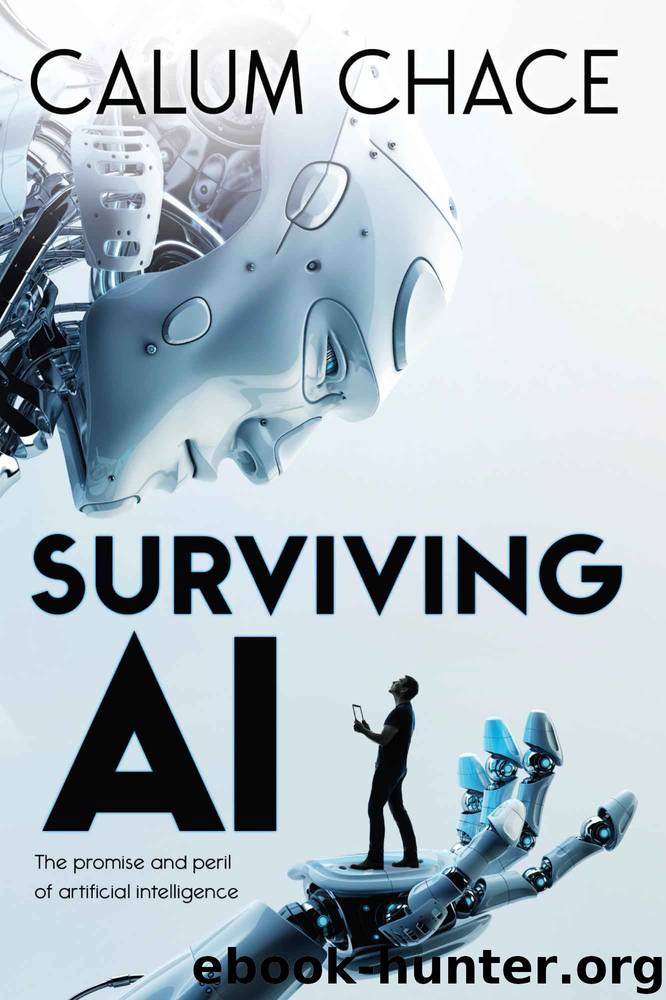Surviving AI: The promise and peril of artificial intelligence by Calum Chace

Author:Calum Chace [Chace, Calum]
Language: eng
Format: epub, azw3
Tags: General Non-Fiction
Publisher: Three Cs
Published: 2015-08-30T21:00:00+00:00
CHAPTER 5
WHEN MIGHT AGI ARRIVE?
5.1 – Expert opinion
Some people think it will be soon
Elon Musk has made a name for himself as a Cassandra about AI, with remarks about working on AGI being akin to summoning the demon, and how humans might turn out to be just the boot loader (startup system) for digital superintelligence. Not only does he see AGI as an existential threat to humanity: he also thinks the danger will manifest soon. In a post at Edge.com (36) which was subsequently deleted, he said “The pace of progress in artificial intelligence (I’m not referring to narrow AI) is incredibly fast. Unless you have direct exposure to groups like Deepmind, you have no idea how fast – it is growing at a pace close to exponential. The risk of something seriously dangerous happening is in the five year timeframe. 10 years at most. This is not a case of crying wolf about something I don’t understand.”
Demis Hassabis, founder of the company Musk was referring to responded by downplaying the immediacy of the threat: “We agree with him there are risks that need to be borne in mind, but we’re decades away from any sort of technology that we need to worry about,”
Whatever you think of Musk’s warnings, he has at least put his money where his mouth is. He invests in companies like DeepMind and Vicarious, another AI pioneer, in order to keep up to speed with their progress. And he has donated $10 million to the Future of Life Institute, one of the organisations looking for ways to make the arrival of AGI safe.
However genuine and well-informed Musk’s fears are, there are plenty of people who remain sceptical.
The future isn’t what it used to be
We are curiously nostalgic about the future. People point out that technologies which futurists confidently expected several decades ago have yet to materialise: “where’s my jetpack?” is a common refrain. When 2015 rolled around, people celebrated the fact that this was the year depicted in Back to the Future, the biggest movie of 1985, by asking, “hey dude, where’s my hoverboard?”
PayPal founder Peter Thiel laments the slower-than-expected progress by saying that “we were promised flying cars and instead what we got was 140 characters” (ie, Twitter).
Yet we also got the ability to access almost every fact, idea or thought that a human has ever recorded within a couple of seconds, which people 100 years ago would probably have viewed as far more impressive than flying cars. It is amazing how quickly we humans become habituated to the marvels we create, and simply take them for granted. We will look at this again later in this chapter.
Similarly, some people are dismissive of the progress made by artificial intelligence since the discipline began 60 years ago, complaining that we don’t yet have a machine which knows it is alive. But it is daft to dismiss as failures today’s best pattern recognition systems, self-driving cars, and machines which can beat any human at many games of skill.
Download
Surviving AI: The promise and peril of artificial intelligence by Calum Chace.azw3
This site does not store any files on its server. We only index and link to content provided by other sites. Please contact the content providers to delete copyright contents if any and email us, we'll remove relevant links or contents immediately.
The Mikado Method by Ola Ellnestam Daniel Brolund(22542)
Hello! Python by Anthony Briggs(21722)
Secrets of the JavaScript Ninja by John Resig Bear Bibeault(20297)
Dependency Injection in .NET by Mark Seemann(19635)
The Well-Grounded Java Developer by Benjamin J. Evans Martijn Verburg(19403)
Kotlin in Action by Dmitry Jemerov(19348)
OCA Java SE 8 Programmer I Certification Guide by Mala Gupta(18841)
Algorithms of the Intelligent Web by Haralambos Marmanis;Dmitry Babenko(17650)
Adobe Camera Raw For Digital Photographers Only by Rob Sheppard(16969)
Grails in Action by Glen Smith Peter Ledbrook(16801)
Sass and Compass in Action by Wynn Netherland Nathan Weizenbaum Chris Eppstein Brandon Mathis(14284)
Secrets of the JavaScript Ninja by John Resig & Bear Bibeault(12245)
Test-Driven iOS Development with Swift 4 by Dominik Hauser(10948)
A Developer's Guide to Building Resilient Cloud Applications with Azure by Hamida Rebai Trabelsi(10598)
Jquery UI in Action : Master the concepts Of Jquery UI: A Step By Step Approach by ANMOL GOYAL(10070)
Hit Refresh by Satya Nadella(9125)
The Kubernetes Operator Framework Book by Michael Dame(8542)
Exploring Deepfakes by Bryan Lyon and Matt Tora(8367)
Robo-Advisor with Python by Aki Ranin(8308)
